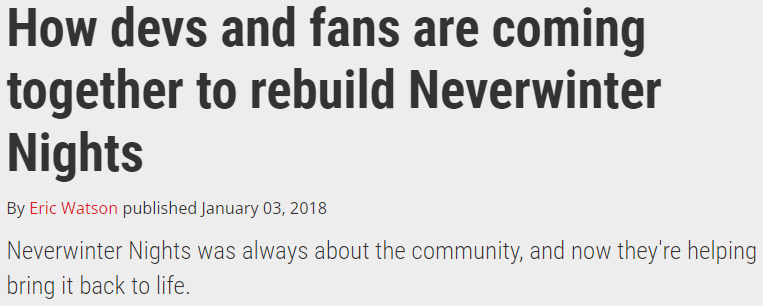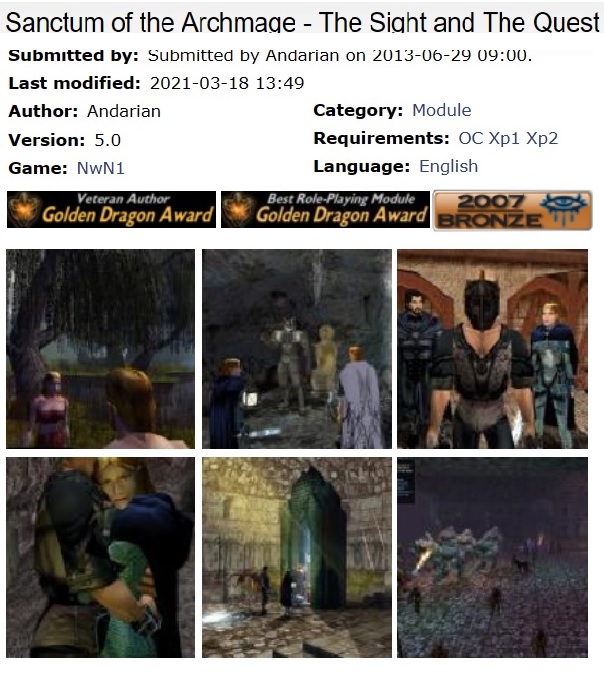(This article began as a response to BGP Hughes’ call for memories and stories about Neverwinter Nights, posted here and here.)
A few years ago, I had the opportunity to contribute to the PC Gamer article on Beamdog’s EE revival of Bioware’s 2002 adventure RPG, Neverwinter Nights (or NWN). I don’t think I can summarize my thoughts on the 20th anniversary of this classic game better than the way I opened my remarks then, when I wrote that:
In 2002 I was software engineer working on a second graduate degree. I had an opportunity to work in quantum computing (which I ended up doing for about a dozen years), but felt I needed a better background in the science to do it properly. So to say that NWN came into my life when I could least afford the time to fully appreciate it — I was literally working a full time tech job and studying physics on the side — would be an understatement. That’s why it took years for me to really get involved in the NWN “modding” community, which in hindsight is a significant life regret of mine. (I’m not doing quantum physics anymore, but I am still trying to write and make games.)
I wasn’t on the Bioware forums when it was brewing, but I’d heard the scuttlebutt about how “Neverwinter Nights” was going to be something new and unique in computer-based RPGs. So over the next couple of years I bought, played, and enjoyed the game and its expansions. I really wanted to keep going after finishing HotU (Hordes of the Underdark), and I’d heard, thanks to the toolset, that fans were making their own adventures. So I found IGN’s Neverwinter Vault (the place to go for them at the time), downloaded and played my first module, and was hooked.
I spent most of my available game time starting in 2004 playing one NWN module and campaign after another: Aielund, Lords of Darkness, Shadowlords, Dreamcatcher… the list goes on. And as I did, I discovered the first thing that would go on to change my life: that indie modders could often make better and more engaging games than companies with dev budgets in the millions. They usually weren’t as polished, but they were frequently more creative, better storytelling experiences, and more “on target” for what I was looking for as a player. And perhaps most important of all, they showed a willingness to experiment, to take risks in gameplay and narrative design, that I typically didn’t see in the commercial games of the time.
I largely lost sight of the commercial games industry for years as a result. And by the time mid-2005 came around, I knew that I could no longer put off trying my hand at creating my own game. I had an expansive story idea that I’d originally developed as the setting for a D&D campaign years earlier, and that I’d made a (then stalled) attempt to turn into a novel series. So despite a challenging work and grad-school schedule, I began development on an NWN module of my own based on the backstory to that campaign: Sanctum of the Archmage: The Sight.
As I continued to play these modules, and immersed myself over the next few years in building my own adventures, I gradually came to realize that Bioware had — perhaps unintentionally — accomplished something truly unique and ground-breaking. By creating a game-building toolset that was simple enough for many people to use, it put the game creation process, for the first time, within the reach of talented storytellers. These were individuals with rich ideas, but without a commercial (much less AAA) budget or dev team to back them.
This provided a desperately needed “release valve” for the repressed creativity of a generation of frustrated game authors. The resulting firehose of adventures that exploded onto the NWN modding scene over the next decade not only proved and paved the way for some (sometimes controversial) trends that game companies finally began to adopt (such as better and more inclusive romance plots). It also democratized game design and development in a way that had never really been possible before — and as far as I’m aware, has never quite been matched since.
This latter point is worth emphasizing. For nearly every other game that I’m aware of, the word modding refers to making “modifications” to extend an existing, professionally developed game campaign. Anyone who’s played with Skyrim mods knows what I’m talking about: things like new companions and side quests dropped into the world to be played as a part of the base game. Neverwinter Nights (along with Neverwinter Nights 2, and the Bioware game that followed them, Dragon Age: Origins), are the only significant, 21st century games I know of for which modding also has another meaning: not just making modifications, but creating modules. That use of the word took its inspiration from the D&D (and other) “booklets” that Dungeon Masters could buy, which contained a modular adventure (standalone, or part of a series) that they could run for players.
And that word names the key distinction between a game mod and a game module. A module (standalone or series) is an adventure that stands on its own, as its own game. It may be connected to the setting of the original game (as with Wyvern Crown of Cormyr), or it may not (as with The Aielund Saga and Sanctum of the Archmage). It may use or repurpose assets from the original game, include new custom content developed by independent artists and musicians, or (more typically) both. But whatever the use of setting or assets, what Neverwinter Nights gave its customers, for the first time, were the tools to actually make their own games.
The value of that to a player base brimming with creatives hungry to do so, but not fortunate enough to have landed a job in the games industry, can’t be overstated. And for me, after years of trying to “find myself” professionally, it provided a life-changing revelation. I’m still trying to forge a career today as an indie novelist, and to start my own new publishing imprint. But those are an (admittedly strong) second in my list of true passions. After a couple of years of creating my own games with Neverwinter Nights, I knew I’d found my own first calling in life: creating technology enabled interactive fiction. Or, in simpler words: storytelling through computer games.
I also think there’s an interesting comparison to be made about the intersection between indie publishing today, and the growing indie games industry. Just as NWN provided tools (in its time) to enable the democratization of game building, so too has the explosion of indie publishing tools done the same for authors. E-books, print on demand, and audio, and the companies that now provide them, have set writers free from the publishers and agents who gatekept the industry in the past. It’s not an exaggeration to say that I, and most of the other indie authors of today, would not have been able to pursue careers as writers without them.
Similarly, the maturing gamedev tools of today are doing the same for the next generation of indie game builders. Development and engine toolsets like Unity and Unreal, along with 3D and other modeling tools, are making it increasingly possible for the game creators of tomorrow not only to do their work, but to have a shot at making a living at it. And to do so while (at least, hopefully) escaping the creativity-stifling restrictions of the companies that gatekeep those industries today.
So, to sum up: what, on its 20th anniversary, would I have to say is the legacy of Neverwinter Nights in my own life? More than anything else, it’s the game that helped me to rediscover my passion for writing and storytelling, and for role-playing adventure games — at precisely the time that I needed it most. And it’s what helped me to finally discover my true calling in life: storytelling through games.
So Happy 20th Birthday, Neverwinter Nights — the game that changed my life.
Tony Andarian


This article was inspired by BGP Hughes’ call for memories on the 20th Anniversary of the publication of Neverwinter Nights, posted on the Neverwinter Nights Forum.
https://forum.neverwintervault.org/t/neverwinter-nights-is-officially-20/5409